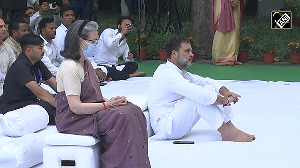There was a time that Gopalkrishna Gokhale's statement: 'What Bengal thinks today, India thinks tomorrow,' was true for a variety of fields. In science, literature, culture, philosophy, and politics, many giants of the Indian renaissance of the past two centuries were Bengalis.
But no more!
Bengal's current leaders are prophets looking backwards. Choosing slogans over commonsense, they have led the state, the most industrialized region of India 50 years ago, to economic ruin. Marxists functionaries have created a patronage system to control public life and stifle dissent. In the last panchayati elections held in May 2003, Opposition candidates were prevented from filing their nomination papers in several seats.
Kolkata is perhaps the world's last bastion of orthodox Marxist ideology. Although the government now claims to recognize the importance of industry and labour peace, it is yet to make fundamental changes in its approach to decision-making or treat its own culture with respect.
Five years ago, Jyoti Basu famously called the BJP leaders 'barbaric' and 'uncivilized.' He was articulating the disdain of the Westernized elite for the BJP's middle-class, desi moorings. The shopkeeper and the priest, supposed supporters of the BJP, are stock figures in the Left's demonology.
The real world is much more complex than the simple categories of the Left's analysis. An exaggerated sense of self-importance related to impending revolutionary change in the world distorts its reality. Some humour will do it good, since it reminds us that we are not gods or goddesses.
An elitist attitude, springing from a colonial way of seeing India, makes the Left decry the use of the traditional arati as formal welcome, but finds nothing wrong with the ritual and garb at the university convocations that spring from Christian ceremony.
We live in the global village and the origins of common ceremonies should not matter. For example, hatha yoga is now taught at Churches in the West and it is not unusual to see instructors asking their students to repeat Sanskrit mantras. Likewise, in marital arts courses, the use of Chinese, Japanese or Korean ceremonies (that have a religious basis) is considered appropriate.
More than the ideology itself -- because not too many believe in it any longer -- there is hypocrisy in the Left's critique of Indian tradition. Just last month Chief Minister Buddhadeb Bhattacharjee wrote to the prime minister complaining against the singing of Saraswati Vandana at the Bharatiyam Cultural Centre inaugural ceremony on November 19 at Salt Lake where he was a guest along with Vice-President Bhairon Singh Shekhawat and Tourism Minister Jagmohan. Left Front Chairman Biman Bose has also complained.
But Saraswati in India is like the Goddesses Fortuna and Liberty of the Roman religion. Marxists have no hesitation in invoking Fortune and Liberty, presumably because they are a part of European culture, from which Marx's ideology emerged. The Left's antipathy to Saraswati is nothing more than a slavish repetition of the colonial prejudices of the Europeans about Indian culture a hundred years ago.
The West Bengal government's ban on Taslima Nasreen's autobiography, Dwikhandita, is also driven by attitudes that are alien to the spirit of our times. Some intellectuals have justified it on the ground that controversial books are banned in the West.
This argument is false. When one reads of attempts by the Christian right in the United States to ban books dealing with evolution or sex, it is about taking these books off library shelves in schools, on the plea that they may not be the right material for children. I am not aware of any case where activists have sought to ban the sale of books. It must also be noted that in spite of such campaigns, the books stay in school libraries.
Free currency of books is a necessary corollary to free speech. Ideas are like gene lines and just as species must not be allowed to die, we must not ban ideas or creative attitudes, especially if they challenge conventional wisdom.
In the case of Taslima Nasreen's book, some authors are enraged that accounts of their personal affairs are part of her story. I think that is for the good. Taslima is absolutely right when she says that it is essential to show famous people for what they really are -- ordinary humans with their own ordinary weaknesses.
Even if her book is not great literature, as some critics assert, it is valuable as a document that describes contemporary celebrities and writers. It shows that genius in India and Bangladesh is no different from genius elsewhere, in having its dark side.
It is as bad for writers and poets to think too highly of themselves as it is for politicians. This habit is a consequence of the unduly privileged position the official elite have occupied in the recent decades in India's public life, a position that was a consequence of the over-centralization of authority, whose origins, in turn, are in the colonial administration and control at the basis of the Government of India Act of 1935 that became the major part of the Indian Constitution of 1950.
It will be helpful to the government if its powers were circumscribed in certain spheres. If the right to free speech is guaranteed, then politicians or aggrieved authors will not pressure the government to ban this book or that.
The Left needs to recognize that culture is an expression of a variety of aesthetic attitudes. Its proclaimed distaste for the traditional Saraswati Vandana can only be viewed as petty narrow-mindedness. Even if its aesthetic sense is different -- and superior -- to that of the desi BJP's, doesn't the democratic impulse require that it focus on the substantial issues of governance and put up with the poor taste of its political opponents with good humour?





